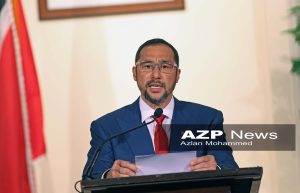
WHY must citizens of a poor, struggling country suffer when its brightest minds and talented citizens are attracted to wealthy developed countries? T
his is a grave injustice and there is a need to intervene to stop the brain drain.
Developed countries should be training their own people and not adopt the lazy and unethical approach of constantly seeking diligent and skilled immigrants to continue building their economies at the expense of economically weaker countries.
The recruiting countries have failed to realise that developing countries without their best minds and bodies, will obviously suffer and be more vulnerable to economic collapse and political instability. And, then it will be the developed countries that will point a scolding finger, chastise, intervene or offer financial assistance to a crisis. Usually, if a developed country’s investment is at stake or its people are at risk this would prove to be a factor prompting assistance to a developing country.

Why would a developed country constantly demand the physical and mental labour from the rest of the world? Is it not enough that they are already exploiting the natural resources of the developing world ? There is now the urgency for countries in Global South to intervene and volunteer services to other developing countries that underwent a political upheaval or experienced a natural disaster.
The remedy for developing countries is that they must recognise and laud their scholars, scientists, artistes, businessmen, artists, sporting heroes and professionals for sacrifices and achievements. These persons will provide role models for the youths of the nation. Furthermore, in acknowledging contributions will serve the dual purpose of fostering nationalism and patriotism among citizens who might then be less inclined to emigrate.

Citizens of developing nations must be aware of the advantages of remaining rather than migrating and of contributing rather than criticising. Thus, the inhabitants of developing economies must be aware and appreciate their history, culture and more importantly, their role in rebuilding the society. Among the basic requirements of a society seeking high productivity is the existence of a reliable security force, an efficient health service, an unbiased legal system, clean water, a reduction in crime, affordable food prices and political stability.
One of the obvious problems facing these citizens is an inadequate sense of their heritage and distorted identity. The concept of nationhood is often not properly constructed and fostered. Possessing and displaying a national dish, emblem, currency, animal, instrument, motto, flag and anthem is not sufficient. These are only external symbols and common throughout the world’s nations. Supporting a sporting team or participating in a festival is superficial patriotism. Certainly, this is only one component of the criteria essential in formulating a nation’s identity.

Why must developing countries suffer as a result of recession, inflation or a global financial crisis that originated in a developed country? A major irony in the game of capitalism is that the developed countries with their strong currencies and gold reserves which empower them with global clout are very dependent on the countries of the developing bloc.
If the developing countries established one currency, developed a stock exchange, formed an exclusive trading bloc and prevented migration to developed countries, then there will definitely be a ‘crisis’. There will only be some semblance of equality and fair play when countries in the South are treated on an equal basis with First World countries.

Why must a developing nation, seeking partial debt forgiveness, bow to the demands of a prosperous First World country ? Developing countries must be respected and treated with dignity. They must not be held at economic ransom and be forced to compromise cherished moral and ethical principles. Despite considerable debt cancellation and debtor relief, there seems to be no end to the problem. Obviously, this has hindered reconstruction in such countries as Argentina, Bolivia, Bangladesh, Albania, Hungary and Nicaragua.
Increasing financial aid and material assistance to developing countries is only a partial answer to the crippling debt crisis.
Dr Jerome Teelucksingh is a recipient of the Humming Bird (Gold) Medal for Education and Volunteerism. He is attached to the Department of History at the University of the West Indies at St Augustine. He has published books, chapters and journal articles on the Caribbean diaspora, masculinity, culture, politics, ethnicity and religion. Also, he has produced a documentary – Brown Lives Matter and presented papers at academic conferences.
See other articles by Dr Jerome Teelucksingh on AZP News:
The Influence of Labour on Caribbean Integration
The illusion of political Unity
Presbyterians in Trinidad: Humble Missionaries, Local Workers
Religious Plurality: Curse or Blessing
Caribbean Youth Need Optimism, Patriotism
Rethinking Identities in Caribbean, Latin America
November 19: All Inclusive International Men’s Day
Should International Agencies be Blamed for Unemployment
A Need to Observe Word Unemployment Day
An Ideology for the Trade Union Movement
The Man who Couldn’t be Prime Minister
Social Outburst vs Social Revolution
Challenges of the Men’s Movement
If George Floyd was Denied Parole
The Meaning of Indian Arrival Day in T&T
International Men’s Day – A Way of Life
Wounds that cause school violence
May Day: A Time for Solidarity, Strength
Who Coined the Term ‘Black Power’
The illusion of political Unity
Presbyterians in Trinidad: Humble Missionaries, Local Workers
Religious Plurality: Curse or Blessing
Caribbean Youth Need Optimism, Patriotism
Rethinking Identities in Caribbean, Latin America
November 19: All Inclusive International Men’s Day
Should International Agencies be Blamed for Unemployment
A Need to Observe Word Unemployment Day
An Ideology for the Trade Union Movement
The Man who Couldn’t be Prime Minister
Social Outburst vs Social Revolution
Challenges of the Men’s Movement
If George Floyd was Denied Parole
The Meaning of Indian Arrival Day in T&T
International Men’s Day – A Way of Life
Wounds that cause school violence
May Day: A Time for Solidarity, Strength
Who Coined the Term ‘Black Power’
![]()










